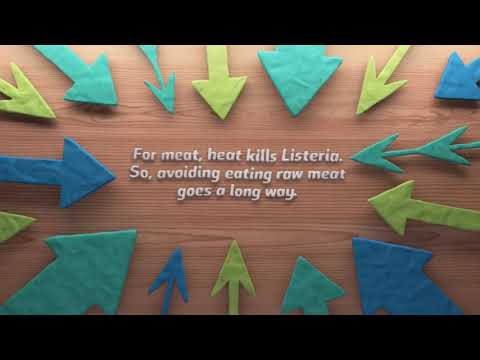Listeria Monocytogenes
We hope you have looked at our E. coli and Salmonella videos and are well on your way to being a food safety expert. But to get you even closer to reaching your “foodborne illness hero” status, we wanted to present you with one more video for our series. Our last installment is on Listeria monocytogenes. Listeria monocytogenes is a type of bacteria commonly found in the environment in multiple places — soil, ground water and on plants.
Putting Your Listeria Vision Goggles On
While this bacterium can be commonly found in the environment, meaning it has the ability to grow on farms, there are ways to sidestep encountering it in our foods. For instance, because Listeria can be found in the intestines of farm animals, it can be found in dairy products and meats. Contaminated milk, however, is cleared of bacteria via pasteurization, which kills them. So you should also avoid unpasteurized milk and cheeses.
For meat, it is important to avoid uncooked meats (cooking kills Listeria) and to use safe food-handling practices, as we’ve mentioned in our last two video posts. Listeria also has the ability to grow on raw vegetables, so it is important to make sure to rinse vegetables well with water before consuming.
When this bacteria is in our food, it can make its way to the gastrointestinal tract where it can begin an illness called listeriosis. While most healthy people are not at risk for listeriosis, even if they eat food that contains the bacteria, those with weakened immune systems such as children, those with chronic illness, the elderly, and most often pregnant women are more susceptible to listeriosis.
Despite the persistence of Listeria monocytogenes, outbreaks are relatively rare with roughly 0.0005 percent of the U.S. population being impacted annually. But because Listeria can cause foodborne illness, it is important to take precautions and to get educated.
Telling Listeria, “Get Lost!”
Like in our other video posts, we also want to clue you in on how to avoid foodborne illness caused by this additional bacterial culprit. If you’ve reached “prevention wiz” status, you know that you should:
- Keep hands, utensils and countertops clean while prepping foods.
- Thoroughly cook raw meats and poultry and keep them away from other foods like bread, fruit and vegetables.
- Consume perishable and ready-to-eat foods as soon as possible. We should note that Listeria is a foodborne pathogen that can survive for a long period of time at freezing temperatures, so make sure you freeze foods before they expire.
That’s All, Folks
We hope you’ve enjoyed our “Microbe 101” video series. E.coli, Salmonella and Listeria are major foodborne illness threats. Be sure to follow our food safety advice to help avoid foodborne illness … and keep being a Food Safety Rock Star!

